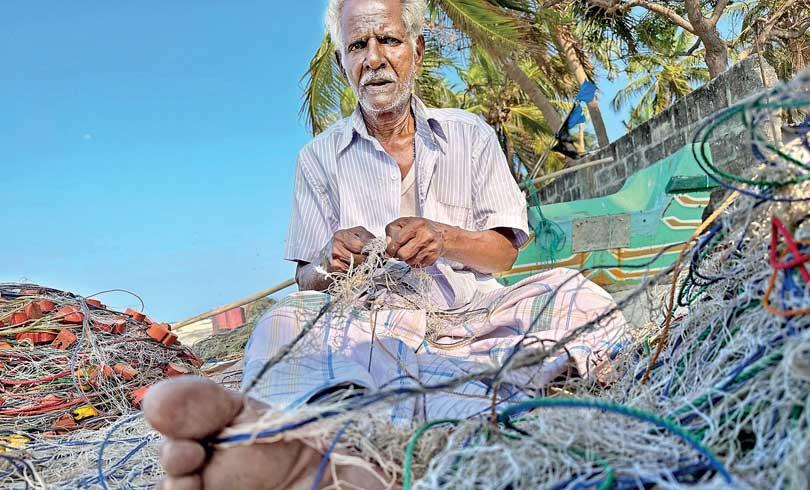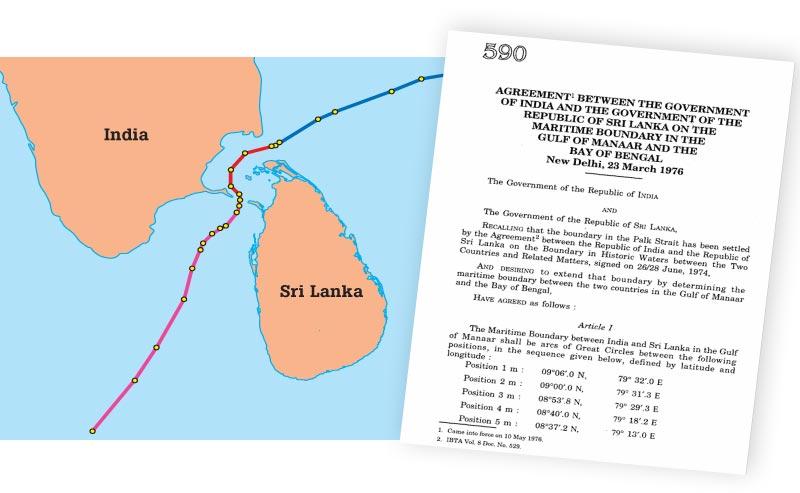Reply To:
Name - Reply Comment
Last Updated : 2024-04-27 08:30:00

The future of fishermen in Sri Lanka looks bleak with poaching by Indian fishermen increasing and the two nations unable to find a solution to this persisting issue

|
The crisis faced by Sri Lanka fishermen has intensified due to Indian fishermen entering the Sri Lankan sea area using their trawlers
The Ministry estimates that the daily economic loss caused by the Indian fishing problem is around 350 million rupees
Normally, numerous Indian trawler boats enter the Sri Lankan sea area, but the number of arrests and court cases against them is minimal
The number of Indian fishermen arrested by the Navy this year is over 150
The punishment for illegal fishing in Sri Lankan waters by foreign boats includes imprisonment for up to two years and a large fine |
 Reginald is a fisherman who has been battling sea waves for 20 years while being engaged in his job. He sees his present struggle being intensified compared to his past experiences. This struggle is not just for himself, but also for the well-being of his family, the headcount at home also includes three children.
Reginald is a fisherman who has been battling sea waves for 20 years while being engaged in his job. He sees his present struggle being intensified compared to his past experiences. This struggle is not just for himself, but also for the well-being of his family, the headcount at home also includes three children.
Not only Reginald, but also fishermen in the northern province are facing a severe crisis. The reason for this crisis is the fishing activities of Indian fishermen, who enter the Sri Lankan sea area using their trawlers.
Despite the fishermen raising their voices and demanding necessary measures for many years, no proper solution to this problem has been found thus far. It’s particularly notable that hundreds of Indian fishermen enter the Sri Lankan sea despite being monitored by the Sri Lankan Navy.
Reginald, who resides on Delft Island under the supervision of the Sri Lankan Navy, began his fishing venture with his father. He embarked on his seafaring career after marriage; starting with a small boat.
|
- Dr. Waradas Thyagaraja - |
“I’m using my boat without a motor. I don’t have enough money to buy one. Hence I can’t go too far. In the past, I used traditional nets for fishing. Indian fishermen who came by trawler boats damaged them. So, now I use a small net for fishing. Because of this, I can’t catch as many fish as before. So, I spend two to three hours in the sea. I have three children. My eldest son is in grade five. I have to incur many expenses for them. The cost of many items is much higher than before. It is very difficult to provide for the well-being of the family,” Reginald said.
According to a report presented by Dr. Sanath de Silva at a working committee meeting, organised by the US Defense University in Istanbul, Turkey, in 2008, the sea border between Sri Lanka and India is divided into three sea areas: the Bay of Bengal in the north, the Straits of Palk in the middle, and the Bay of Mannar in the south. The report states that the average distance between Sri Lanka and India across the Palk Strait is about 32 km. Reginald, who commented earlier, does his fishing in the sea area around the Palk Strait. Many fishermen, like Reginald, faced the same problem many years ago. Therefore, the need to divide the maritime boundary between India and Sri Lanka takes us back in time to a historical juncture. According to Silva, how this sea border was separated has been described in that paper as follows.
“In 1957 Sri Lanka proclaimed her sovereign rights over the continental shelf in order to take conservation measures and to regulate fishing in the sea within her territorial waters. Then onwards we can identify a period of silent relationship till 1970s was a significant landmark period since Sri Lanka resolved her maritime boundary disputes with India during this time. The Government of Prime Minister Sirimavo Bandaranaike pointed out the need of delimiting the waters of the Gulf of Mannar, the Palk Bay, and Palk Strait to the Government of Mrs. Indira Gandhi of India. Both countries agreed to the proposition that in order to regulate the activities between the two countries there should be a formal demarcation of the maritime boundary that is acceptable to each other.
“On the other hand, the over exploitation of resources in the Palk Strait was also a concern highlighted by both governments. After a few rounds of talks the two governments agreed to recognise the territorial waters as defined by the maritime legislation enacted by Sri Lanka and India in 1974 and 1976. On 15th January 1977 the Sri Lankan government formally declared Sri Lanka’s side of the maritime boundary. Katchchativu Island was left to Sri Lankan ownership as a result of this agreement,” said De Silva.
The distance from Kachchativu Island in Sri Lanka to Rameshwaram in India is approximately 14 nautical miles, which means it’s about 26 kilometres. The Sri Lankan Navy, which has extended its authority approximately 60 kilometres to Kachchativu from Jaffna, has taken occasional action regarding Indian trawler boats that enter the Sri Lankan sea by crossing the line of international waters. However, the leaders of fisheries associations in the north claim that the entry of Indian trawler boats into the Sri Lankan sea area occurs daily.
“This is a serious issue. The failure of institutions, including the Sri Lankan Navy, to take necessary action against Indian fishermen is the main reason why this continues to happen. Normally, numerous Indian trawler boats enter the Sri Lankan sea area, but the number of arrests and court cases against them is minimal. However, this occurrence could be prevented with the necessary intervention from relevant institutions. It doesn’t seem that the Ministry of Fisheries is taking action to address these issues. The trawlers used by Indian fishermen are larger than those owned by the northern fishermen. They enter our sea area daily, causing numerous problems. One major issue is the push towards a significant economic crisis. This affects the income of fishermen in the north by depleting fishing resources and causing damage to the nets of Sri Lankan fishermen by Indian trawlers. There have been incidents involving damage to boats owned by our fishermen,” said Annalingam Annarasa, President of Kytes Fisheries Corporation.
Annarasa stated that Sri Lanka has a legal system in place to prevent the arrival of trawlers from India. Section 04 of the Fisheries (Regulation of Foreign Fishing Boats) Act No. 59 of 1979 states that foreign fishing boats should not be used for fishing in Sri Lankan waters for activities related to fisheries without a permit, which is issued under Section 06 of the act. Section 05 of the Act states that if a foreign boat enters Sri Lankan waters the fishing gear on that boat must be stored in a proper manner, so as to prevent fish from being caught.
|
- Annalingam Annarasa, President Kytes Fisheries Corporation - |
The relevant authorities are empowered to stop foreign boats, conduct searches, seize boats with or without a warrant, and arrest individuals. In 2018, amendments were made to this law, introducing additional clauses assigning responsibility to commanders of the armed forces in Sri Lanka and the head of the Coastal Conservation Department for its enforcement. The punishment for illegal fishing in Sri Lankan waters by foreign boats includes imprisonment for up to two years and a large fine. The law stipulates that court trials related to this offense shall be concluded within a month. The minister responsible for executing this law has been granted extensive powers, including the ability to create regulations. Regulations were issued under this act in 1981, outlining the procedure for obtaining permission to enter Sri Lankanwaters.
The Ministry of Fisheries and the Department of Fisheries and Aquatic Resources have an irrevocable responsibility to implement these laws. A discussion was held on January 24, 2023, under the chairmanship of the Minister of Fisheries, Douglas Devananda, regarding the necessary measures to completely stop the illegal fishing activities carried out by Indian fishermen in the North Sea. Additionally, the respective institutions were made aware of illegal foreign fishing vessels and fishermen in 2023.
However, the Government has still failed to provide sufficient assistance to address the issues faced by fishermen in the North due to Indian trawlers. The problem continues to worsen.
When this newspaper made inquiries regarding this issue from the Secretary Ministry of Fisheries K.N. Kumari Somarathna, she stated that it should be resolved through negotiations between the two countries. “Discussions on this matter have been ongoing between the two countries for several years. We have requested the Ministry of Foreign Affairs to initiate discussions on this matter once again. We are aware that the Foreign Minister is also actively working on it. Necessary measures are being taken to amend the existing laws concerning this issue, and it is currently in the final stages. Currently, the law specifies the punishment for the first arrest and the punishment for repeated arrests,” Somarathna said.
When asked why the Navy has not been instructed to use its power to make arrests under the act, the Secretary stated that the act is still in effect, and arrests are currently being made accordingly. “However, it is preferable to resolve this issue through negotiations between the two countries,” she added. When questioned about the worsening of this problem in the north in recent days, she acknowledged such a development was taking place.
Commitment extended to solve issue not the same.
According to Somarathna, bilateral discussions were held to resolve this issue. In 2017, a diplomatic group, along with Sri Lankan fisheries representatives and civil activists, visited New Delhi, India, and held discussions with Indian fisheries representatives and government officials. Dr. Waradas Thyagaraja, also participating in the discussions as a Fishermen’s Society advisor, was a member of the expert committee appointed by then Fisheries Minister Mahinda Amaraweera to address this problem. However, he does not have a good idea of how to solve this problem through negotiation.
|
Secretary of the Ministry of Fisheries, Mrs. K.N. Kumari Somarathna
|
“We went to Delhi in 2017 and discussed the issue. Discussions have been ongoing for many years, but there has been no solution. For negotiations to succeed, both parties need to show commitment. While Sri Lanka has demonstrated commitment, the same cannot be said about India. In 2018, then Fisheries Minister Mahinda Amaraweera took steps to amend the relevant Act which was a positive decision. The amendment empowered the Magistrate’s Court to hear cases related to arrested Indian fishermen and increased the associated fines. Another significant aspect of the amendment was the provision to confiscate and auction off the boats of offending fishermen. To effectively tackle this issue, Indian fishermen entering Sri Lankan waters should be arrested by the navy. We refer to this as the Domestic Deterrence policy,” said Dr. Thyagaraja.
The number of Indian fishermen arrested by the Navy this year is over 150. Although this is a large number, it is minimal in comparison to the daily arrival of Indian fishermen into Sri Lankan waters, as noted by leaders of the fishing society. Consequently, the Minister of Fisheries has submitted a cabinet paper to establish a voluntary group known as ‘sea guards’ in the North to monitor Indian fishermen entering Sri Lankan waters. The Ministry estimates that the daily economic loss caused by the Indian fishing problem is around 350 million rupees.
The current Minister of Fisheries is believed to have been elected to Parliament by the votes of the northern island fishermen. Leaders of the Northern Fishermen’s Unions have stated that he has not intervened enough to resolve this issue since taking office as the Minister of Fisheries. J. Yardsan Figurado, the head of the Mannar Social Economic Development Organization, who works closely with fishermen in the north, expressed surprise that the Navy, which is active around the islands in the north, did not take necessary action when Indian fishermen entered Sri Lankan waters. Figurado remarked that the Navy could easily do so, but added that they are not fulfilling their responsibilities.
Although necessary steps have been taken to prevent Indian fishermen from entering Sri Lanka’s waters for fishing purposes, Navy’s Media Spokesperson Captain Gayan Wickramasuriya stated that it is practically difficult to take action when about 500 boats arrive at a time. |
Responding to this matter, Fisheries Minister Douglas Devananda said that not only the Central government of India, but also the state governments are in discussions to find solutions to this problem. The minister said that steps will be taken to strictly implement the fishing and foreign boat laws brought in 2017 and 2018. |
Sokrates Thursday, 28 March 2024 10:13 AM
There are other methods than shooting live ammunition. Trawl nets can be cut by driving over them, high-pressure water cannons can also be used also with tear gas, fishing boats can be pushed back with Navy ships. There is also the possibility of hitting the trawlers below the waterline with small power ammunition so that they sink within 30 minutes. In this way, action can also be taken against a fleet of 500 fishing boats. The Sri Lanka Navy has a disproportionate number of ships that can be assembled quickly. On the other hand, Sri Lankan fishermen who poach in Indian waters should also be severely punished in Sri Lanka as a deterrent.
18th Century warfare Thursday, 28 March 2024 06:49 PM
If indian boats are using bottom trawling nets which are dragged along the sea bed, while SRi Lankan fishermen dont do that - then perhaps the Universities and the Navy research units can design some chained hook balls which we drop into the sea bed inter connected with chains. When the indian nets gets entangled it will damage the nets.
NAGA LAND. Friday, 29 March 2024 08:46 PM
NORTHERN PEOPLE, WE CAN BRING SOLUTIONS. TWO STATES ONE COUNTRY.

Add comment
Comments will be edited (grammar, spelling and slang) and authorized at the discretion of Daily Mirror online. The website also has the right not to publish selected comments.
Reply To:
Name - Reply Comment
US authorities are currently reviewing the manifest of every cargo aboard MV
On March 26, a couple arriving from Thailand was arrested with 88 live animal
According to villagers from Naula-Moragolla out of 105 families 80 can afford
Is the situation in Sri Lanka so grim that locals harbour hope that they coul

26 Apr 2024
26 Apr 2024